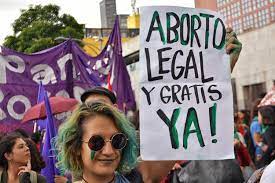Mexican Supreme Court Decriminalizes Abortion
Sergei Valenzuela
Staff Writer
Mexico’s Supreme Court has passed a historic adjudication allowing pregnant women to decide their own reproductive destiny without having to face criminal prosecution. According to Jacobin, the court deemed it was unconstitutional for the state of Coahuila to penalize women for performing a voluntary abortion, an action that previously could have led to up to 3 years in prison. The Supreme Court also proceeded to declare the criminalization of abortion as unconstitutional. Throughout Mexican history, many women have been criminally punished and shamed by their communities for their choice to abort, living in fear that at any time they could face criminal charges. Although the ruling will have rippling effects across Mexico, the change will not be immediate. A push for nationwide application and changes in state legislation will be crucial for the success of this judgement.
While abortion in Mexico has been decriminalized through the court system, there are a few underlying problems that will likely complicate the process of legalization and create obstacles for women who want to seek an abortion in states where it has not yet been legalized. As Reuters explains, only 4 out 32 states in Mexico have legalized abortion. The New York Times reports that lawmakers in Mexico have uplifted doctors’ and nurses’ ability to decide whether they want to take part in an abortion based on their personal beliefs, allowing medical professionals to not only agree to participate in a procedure, but also to opt out. Mexico holds one of the largest populations of Roman Catholics in the world, and historically, Christian democratic parties like PAN (Partido Accion Nacional) have had a stronghold on Mexican politics. This makes the political culture and society as a whole in Mexico rather conservative on the topic of abortion. As Justice Rios Farjat told The Associated Press, “Women are labeled bad or egoistical because “good” women complete the pregnancy and put the baby up for adoption.”
Jacobin continues that the ruling will make it possible for women to abort without having to face criminal consequences and will also open up the opportunity for women who are currently serving jail time for abortion to gain freedom. Though they will not automatically be freed, they will be able to return home once they pursue and complete the appeals process. In addition to these changes, doctors and nurses who were terminated for participating in abortion procedures will have the opportunity to get their licenses and jobs back.
This judgment follows the decision of the state of Texas to make abortion illegal after 6 weeks from conception. As a result, the Mexican territory that borders Texas may receive an influx of Texans who are looking to get an abortion in the coming years, suggests NPR. Above all, the decriminalization of abortion is seen a victory for women’s rights activists from across Latin America.
The ruling came about through the effort that women have put forth in Mexico to fight for their right to choose via protesting, fighting, and drawing attention to the injustice being done against their bodies in order to demand reproductive freedom and the ability to decide their own future. Although this is a win for pro-choice activists, there are still many questions for the future regarding how each state will recognize the court order and the time that it will take for all states to do so. As for medical procedures, experts on medical education in Mexico provided a study that concludes that Mexican medical education has significant deficiencies in the subject of sexual and reproductive health, making dealing with the concept of abortion particularly hard for doctors and even harder for patients.


